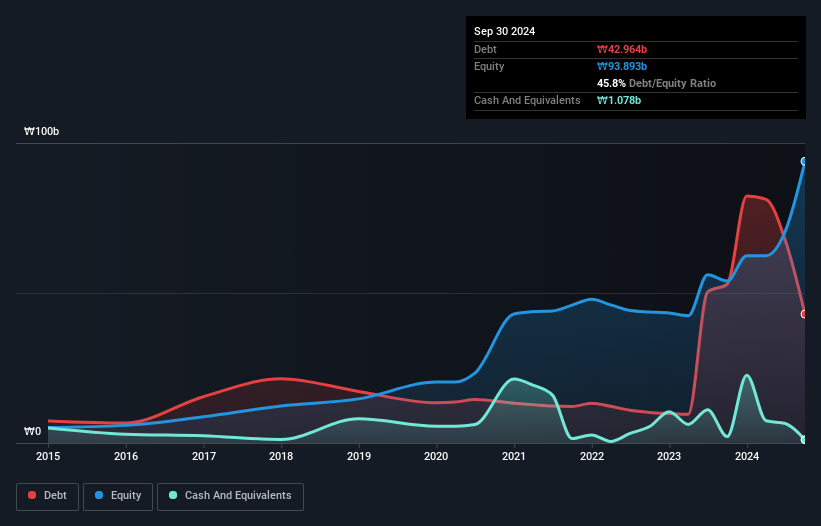
Legendary fund manager Li Lu (who Charlie Munger backed) once said, 'The biggest investment risk is not the volatility of prices, but whether you will suffer a permanent loss of capital.' When we think about how risky a company is, we always like to look at its use of debt, since debt overload can lead to ruin. We can see that Solux Co., Ltd. (KOSDAQ:290690) does use debt in its business. But is this debt a concern to shareholders?
When Is Debt A Problem?
Debt and other liabilities become risky for a business when it cannot easily fulfill those obligations, either with free cash flow or by raising capital at an attractive price. Part and parcel of capitalism is the process of 'creative destruction' where failed businesses are mercilessly liquidated by their bankers. However, a more common (but still painful) scenario is that it has to raise new equity capital at a low price, thus permanently diluting shareholders. Of course, plenty of companies use debt to fund growth, without any negative consequences. The first step when considering a company's debt levels is to consider its cash and debt together.
Check out our latest analysis for Solux
What Is Solux's Net Debt?
As you can see below, Solux had ₩43.0b of debt at September 2024, down from ₩52.9b a year prior. However, because it has a cash reserve of ₩1.08b, its net debt is less, at about ₩41.9b.

How Strong Is Solux's Balance Sheet?
According to the last reported balance sheet, Solux had liabilities of ₩40.6b due within 12 months, and liabilities of ₩13.7b due beyond 12 months. Offsetting this, it had ₩1.08b in cash and ₩20.9b in receivables that were due within 12 months. So its liabilities total ₩32.3b more than the combination of its cash and short-term receivables.
Of course, Solux has a market capitalization of ₩335.7b, so these liabilities are probably manageable. However, we do think it is worth keeping an eye on its balance sheet strength, as it may change over time. There's no doubt that we learn most about debt from the balance sheet. But it is Solux's earnings that will influence how the balance sheet holds up in the future. So if you're keen to discover more about its earnings, it might be worth checking out this graph of its long term earnings trend.
Over 12 months, Solux made a loss at the EBIT level, and saw its revenue drop to ₩57b, which is a fall of 3.2%. That's not what we would hope to see.
Caveat Emptor
Over the last twelve months Solux produced an earnings before interest and tax (EBIT) loss. Indeed, it lost ₩3.9b at the EBIT level. Considering that alongside the liabilities mentioned above does not give us much confidence that company should be using so much debt. So we think its balance sheet is a little strained, though not beyond repair. Another cause for caution is that is bled ₩7.8b in negative free cash flow over the last twelve months. So to be blunt we think it is risky. There's no doubt that we learn most about debt from the balance sheet. However, not all investment risk resides within the balance sheet - far from it. We've identified 3 warning signs with Solux , and understanding them should be part of your investment process.
At the end of the day, it's often better to focus on companies that are free from net debt. You can access our special list of such companies (all with a track record of profit growth). It's free.
New: Manage All Your Stock Portfolios in One Place
We've created the ultimate portfolio companion for stock investors, and it's free.
• Connect an unlimited number of Portfolios and see your total in one currency
• Be alerted to new Warning Signs or Risks via email or mobile
• Track the Fair Value of your stocks
Have feedback on this article? Concerned about the content? Get in touch with us directly. Alternatively, email editorial-team (at) simplywallst.com.
This article by Simply Wall St is general in nature. We provide commentary based on historical data and analyst forecasts only using an unbiased methodology and our articles are not intended to be financial advice. It does not constitute a recommendation to buy or sell any stock, and does not take account of your objectives, or your financial situation. We aim to bring you long-term focused analysis driven by fundamental data. Note that our analysis may not factor in the latest price-sensitive company announcements or qualitative material. Simply Wall St has no position in any stocks mentioned.
About KOSDAQ:A290690
Solux
Manufactures and supplies indoor, outdoor, and special purpose lighting products in South Korea and internationally.
Excellent balance sheet low.
Market Insights
Community Narratives



